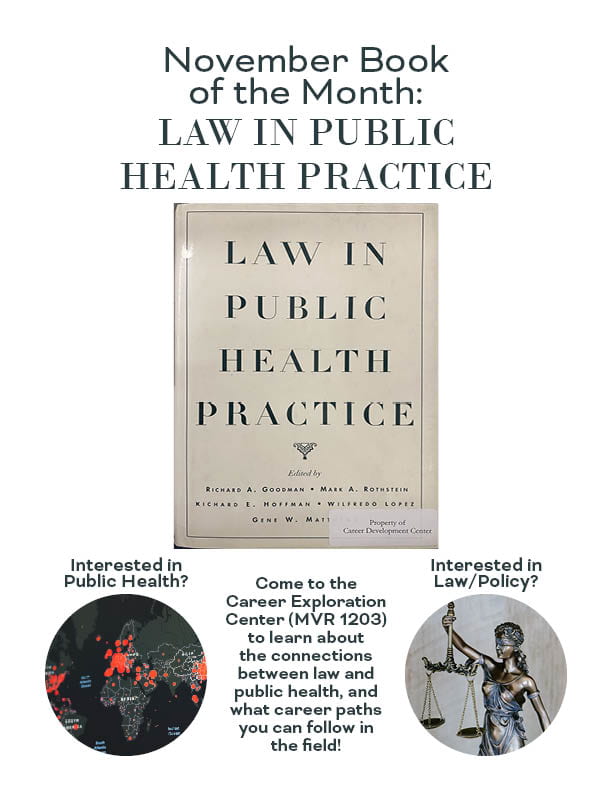Earlier this month, the Global Health Student Advisory Board held their annual Global and Public Health Experiential Learning Symposium, where students shared their experiences from studying abroad. Students interested in global and public health came to the symposium to explore different opportunities abroad and learn about the research projects students conducted this past summer. As students think about what topics in global health interest them, and what related research projects they might want to conduct later on, we will be exploring a unique sector of public health for our November Book of the Month.
This month, we will be reading Law in Public Health Practice written by Richard A. Goodman, Richard E. Hoffman, Wilfredo Lopez, Gene W. Matthews, Mark A. Rothstein, and Karen L. Foster, all of whom are public health professionals from the Centers for Disease Control and Prevention, public health organizations, medical schools, and university public health programs.
Law in Public Health Practice introduces readers to the intersection between public health and law. The book is covered in three main sections–“Legal Basis for Public Health Practice,” “The Law and Core Public Health Functions,” and “The Law in Controlling and Preventing Diseases, Injuries, and Disabilities.”
- Legal Basis for Public Health Practice: This section gives an overview of the fundamental connections between law and public health. Many public health topics such as smoking, vaccines, and disease control are largely addressed through policies and legal actions. Public health is also very applicable to criminal law–especially as technology improves, criminal law investigators can use public health-related topics like epidemiology and genetic analysis to identify causes of crimes as well as to identify potential suspects.
- Law and Core Public Health Functions: Many public health officials work directly with the government through jobs like “the Secretary of the U.S. Department of Health and Human Services, the Surgeon General of the United States, and the Director of the Centers of Disease Control and Prevention to the commissioner of a state or local health department, deputy and assistant commissioners, bureau directors, epidemiologists, public health advisors, and inspectors” (Goodman et al). These officials work with legal advisors to properly address issues like disease outbreaks. This section also discusses legal issues in public health research, as well as managed-care organizations in the U.S. like health insurance companies.
- The Law in Controlling and Preventing Diseases: The last section of the book reviews disease prevention and control. Through the use of genomics and public health-related scientific knowledge, policies can be developed to address issues like foodborne diseases, vaccination mandates, bloodborne and sexually transmitted infections, tobacco usage, and environmental health in the most effective way possible.
Overall, the book goes into detail on the vast field of public health and law, and explores career options for anyone interested in the field. Come over to the Career Exploration Center in MVR 1203 to read the book or talk to a career assistant about exploring this career field! 
